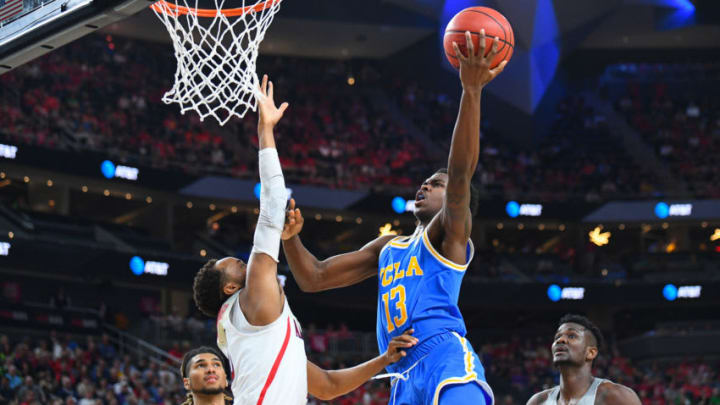A buzz topic you’ll hear heading into the 2018 NBA Draft will be teams trying to find “The Next Donovan Mitchell.” The Jazz rookie looked like the best player in the 2017 Draft class for much of this NBA season year, and despite being picked 13th, he showed primary scorer potential for Utah. This came after two relatively strong, but unspectacular years at Louisville where Mitchell didn’t get a chance to show much of his offensive repertoire.
There probably isn’t a Mitchell in this class, but a good candidate for a sleeper primary scorer might be Kris Wilkes of UCLA. The 6-foot-8 Bruins wing had a perfectly fine year for the Bruins, averaging 13.7 points, 4.9 rebounds, and 1.7 assists per game — good, but nothing screaming “future number one option.” Mostly used as a spot-up shooter next to Aaron Holiday, Wilkes hit 35.2 percent of his 3s this year, but didn’t get much of a chance to prove much beyond that.
However, watching Wilkes in his limited attempts at self-creation, he pops off the screen in a way that could indicate that there’s a more ball-dominant role in his future in the NBA. Combined with his very consistent jumper, his body control around the rim indicates a higher ceiling as a driver than what he’s been able to show so far.
Wilkes has the ability to contort his body well and adjust his position in the air when attacking the basket. That’s a very valuable trait for a primary scorer, as it allows the player to avoid or adjust to contact and put the ball in the hoop at a variety of angles. When Wilkes gets going towards the basket, he is able to adjust and float around opponents, and that allows him to get open looks that other players might not be able to finish.
This wasn’t a large part of Wilkes’s scoring load, mostly because he was a secondary threat behind Aaron Holiday when it came to the initiation load. Wilkes’s looks at the rim were often coming in transition or off secondary actions. However, when called upon he was able to put that body control to good use, such as on this jump-stop attack against Rawle Alkins, a decent defender, he had good results.
Now, what separates Mitchell from Wilkes is that in addition to his role disguising Wilkes’s finishing ability, he has some physical limitations that need to be addressed. Wilkes has a very thin frame for his size, and needs to add strength to be able to finish through contact at a high level. Despite having the ability to finish from all around the basket, Wilkes only landed in the 52nd percentile at the rim among wings, per Will Schreefer’s shot chart data. He’s going to need to add strength to be able to take that aspect of his game to the level where it’s consistently useful at the NBA level. However, as long as he’s able to contort around opponents like this, he’ll have value with the ball in his hands.
Kris Wilkes may not be a lottery-level prospect, but there’s a definite path for him to exceed the initiator value he showed at UCLA. His skill package is impressive, from his shooting, to his passing touch, to that outstanding body control. He has all the tools to build himself into a strong self-creation option, and just needs the right body development and coaching to help him put it all together.
Next: Exploring Jontay Porter's potential offensive outcomes
Wilkes probably won’t average 20 points per game as a rookie like Mitchell did. However, he has the tools to surprise many down the road with an ascension into a quality initiation role, ad a lot of that comes from his ability to compensate for his biggest weakness in his lack of strength.
